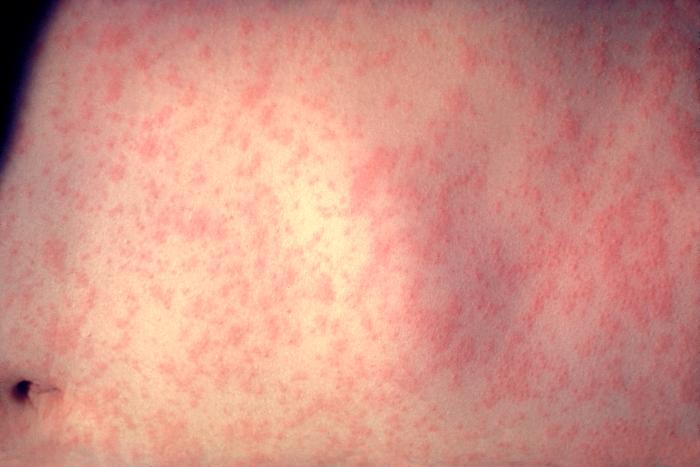There have been three recently confirmed Measles cases in Monroe County. These cases have caused distress and concern for many parents. This article will give you facts about measles, well-respected informational websites to use, and what to do if you think you may have been exposed.
Measles is highly contagious. It is primarily transmitted by coughing and sneezing. The virus can live in the air for hours after an infected person has been there. People are contagious with measles for up to 4 days before and 4 days after they have the measles rash. This can result in people infecting others with the Measles before they even know they have it and again once they are feeling better.
Measles classically presents 7-14 days after exposure to the virus. Common symptoms include high fever (103+), cough, runny nose, and watery eyes. Two to three days after symptoms begin, people will notice white spots inside of their mouths, often referred to as Koplik Spots.
According to the CDC Website: “Three to five days after symptoms begin, a rash breaks out. It usually begins as flat red spots that appear on the face at the hairline and spread downward to the neck, trunk, arms, legs, and feet. Small raised bumps may also appear on top of the flat red spots. The spots may become joined together as they spread from the head to the rest of the body. When the rash appears, a person’s fever may spike to more than 104° Fahrenheit. After a few days, the fever subsides and the rash fades.”

A Measles infection can come with many different complications. It can lead to ear infections, diarrhea, pneumonia, and, in severe cases, encephalitis or even death can result.
The best protection against the Measles is prevention. This is best achieved through vaccination. The CDC states: “Measles can be prevented with MMR vaccine. The vaccine protects against three diseases: measles, mumps, and rubella. CDC recommends children get two doses of MMR vaccine, starting with the first dose at 12 through 15 months of age, and the second dose at 4 through 6 years of age. Teens and adults should also be up to date on their MMR vaccination.
The MMR vaccine is very safe and effective. Two doses of MMR vaccine are about 97% effective at preventing measles; one dose is about 93% effective.”
For additional information on the MMR vaccine, its ingredients, and common questions or concerns check out the Vaccine Education Center website.
If you have specific questions about your vaccination status, possible exposure to Measles, or symptoms you or a family member are experiencing we advise contacting your personal physician’s office directly for personalized guidance.
Helpful Websites:
- Infographic: https://www.cdc.gov/measles/parent-infographic.html
- Measles Signs & Symptoms: https://www.cdc.gov/measles/about/signs-symptoms.html
- Measles Image: https://phil.cdc.gov/details.aspx?pid=3168
- Measles Complications: https://www.cdc.gov/measles/symptoms/complications.html
- Vaccine: https://www.cdc.gov/measles/vaccination.html
- CHOP Vaccine Ed Center: https://www.chop.edu/centers-programs/vaccine-education-center/vaccine-details/measles-mumps-and-rubella-vaccines


You must be logged in to post a comment.